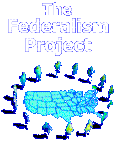|
|
Gonzaga gets a hugely important federalism issue exactly right. The question before the Court was whether federal courts may, under the so-called Section 1983 (of Volume 42 of the U.S. Code), authorize private parties to enforce federal spending statutes against state and local governments. Specifically, may the Federal Educational Rights and Privacy Act of 1974 (FERPA)--which makes federal funds available to schools with approved policies on student privacy--be enforced by private parties? According to a 5-4 Court, no.� Writing for the
Court, Chief Rehnquist argues that Congress did not intend to create an
individual right under FERPA, and with no rights-giving language, there can be
no private party/Section 1983 litigation. Besides, FERPA sets up a clear
enforcement agent (the Secretary of Education) and a highly effective
enforcement mechanism (funds may be terminated if schools misbehave). According
to the Chief, "some language in our
opinions might be read to suggest that something less than an unambiguously
conferred right is enforceable by �1983,"; however, "we now reject
the notion that our cases permit anything short of an unambiguously conferred
right to support a cause of action".�� � |
||||||||||||||


